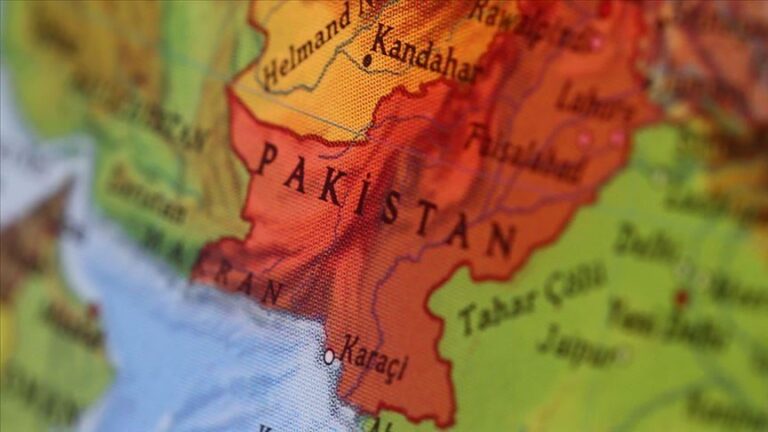
Courtesy: AFP
Muhammad Oves Anwar
The Kashmir Dispute, minus the rhetoric, is in essence a legal dispute over sovereign title to territory and the Kashmiri people’s right of self-determination. The events of 5th August 2019 have compelled Pakistan, the Kashmiri people’s prime advocate at the international stage, to face a harsh new reality but also offer opportunities to reimagine the Kashmir dispute and evolve its decades old narrative. It is important to examine the issue of sovereign title to the territory of Kashmir under international law, the need for ‘occupation’ and ‘unlawful annexation’ terminology in Pakistan’s messaging on Kashmir, as well as the necessity to reframe Indian atrocities in the disputed territory as war crimes.
Sovereign Title to Jammu & Kashmir
India’s claim to sovereign title over the territory of Jammu & Kashmir is based upon the Instrument of Accession entered into by Jammu & Kashmir’s Maharaja Hari Singh with the Government of India, purportedly on 26 October 1947. An Instrument of Accession is a form of a Treaty of Cession wherein one Sovereign, having control over certain territory, can transfer title of that territory to another Sovereign. However, where such a treaty is subject to the condition of a plebiscite, the transfer of sovereign title is not perfected until the plebiscite is conducted and the people vote in favour of such a transfer. The Maharaja’s Instrument of Accession is indeed conditional upon a plebiscite and the evidence for this is unequivocal.
The most compelling piece of evidence is the letter Lord Mountbatten, Governor General of India, sent to the Maharaja accepting his Instrument of Accession on 27 October 1947, which notes, “…it is my Government’s wish that as soon as law and order have been restored in Kashmir and her soil cleared of the invader, the question of the State’s accession should be settled by a reference to the people.” Nehru, India’s Prime Minister, further confirmed the legal obligation of holding a plebiscite in Kashmir on 2nd November, 1947 when he stated in a broadcast:
“We have decided to accept this accession and to send troops by air, but we made a condition that the accession would have to be considered by the people of Kashmir… It was for them ultimately to decide.
…It was in accordance with this policy that we added a proviso to the Instrument of Accession of Kashmir.” [Emphasis added]
International Law is clear on such matters – a treaty of cession becomes effective only with the actual transfer of title. As the Permanent Court of International Justice noted in the Lighthouses Case (1937), that until the date of the “entire disappearance of any political link” with the ceding State (in this case Jammu & Kashmir), the sovereignty over the ceded territory remains with the ceding State. Schwarzenberger (1957) noted, “In exceptional circumstances, as when the transfer depends on a plebiscite, this date may be subsequent to that of the cession treaty coming into force.” India has never held a plebiscite in Jammu & Kashmir and, therefore, the date of actual transfer of title has never come to pass.
It is notable that the issue of plebiscite in Kashmir predates the UN Security Council resolutions on Kashmir, which merely confirm and re-emphasize this legal requirement. India’s attempts to utilize the J&K Constituent Assembly to fulfill the requirement of ascertaining the will of the people of Kashmir were roundly rejected by the UN Security Council in resolutions 91 (1951) and 122 (1957) which stated that Security Council:
“1. Reaffirms the affirmation in its resolution 91 (1951) and declares that the convening of a constituent assembly as recommended by the General Council of the “All Jammu and Kashmir National Conference” and any action that assembly may have taken or might attempt to take to determine the future shape and affiliation of the entire State… would not constitute a disposition of the State in accordance with the above principle [of a free and impartial plebiscite];” [Emphasis added]
Occupation under International Law
Without sovereign title, India’s presence in Kashmir amounts to an ‘occupation’
under international law, its subsuming of Kashmir into its own territory amounts to an ‘unlawful annexation’, and the atrocities it commits amount to ‘war crimes’. These are
legal terms, well-established in International Law and carry significant gravity in such discourse.
An ‘occupation’ is defined by the International Committee of the Red Cross (ICRC) as “when a State exercises an unconsented-to effective control over a territory on which it has no sovereign title.” This is based on the more classic definition found in Article 42 of the Hague Regulations of 1907 which notes, “Territory is considered occupied when it is actually placed under the authority of the hostile army. The occupation extends only to the territory where such authority has been established and can be exercised.”
The foregoing has established that India does not have sovereign title to Jammu & Kashmir. It is also abundantly evident that India exercises effective control over territory on its side of the Line of Control, enforced by the presence of over 700,000 troops (currently over 900,000) in Kashmir and by the extension and implementation of its own Constitutional and legal framework there. The final requirement for an occupation is that of Indian forces being a ‘hostile army’ i.e. lacking the consent of the Kashmiris.
While the Maharaja may have requested Indian military support in October 1947, the continued deployment of Indian forces has been the very tool used to suppress any chance of a plebiscite and prevent the Kashmiri’s from perfecting the transfer of sovereign title. In other words, India’s fear that a plebiscite would go against them compelled them to find alternative means of trying to perfect their title to Kashmir, means that were rejected by the UN Security Council. What India has tried to normalize is its inchoate title to Kashmir, a grey area which suits its unlawful actions. The alternative would mean India would, in all likelihood, lose Kashmir altogether. India has demonstrated an escalation of commitment regarding its past illegalities leading it to assign blame to everyone but itself.This position has forced it to refer to Kashmir as an internal issue, emphasize that talks with Pakistan on Kashmir will only focus on ‘Pakistan Occupied Kashmir’, and that it is Pakistan sponsored terrorist groups which are the cause of strife in the region. The events of 5th August 2019 are merely the latest iteration of this decades old compulsion. Yet nothing India does or says belie the legal and factual reality that Indian forces are a hostile army exercising unconsented to effective control over territory India has no sovereign title to.
The occupation argument stands even if we assume the validity of India’s position on the Instrument of Accession and the actions of the J&K Constituent Assembly. This is because the revocation of Article 370 of the Indian Constitution, has violated the terms upon which J&K purportedly acceded to India. Article 370 which guaranteed Kashmir’s special autonomous status, as well as the guarantee to maintain Kashmir’s demographics through Article 35-A of the Indian Constitution, was the price India paid for Kashmir’s accession to it. Therefore, whatever consent or invitation the Indian Forces had, after the events of 5th August 2019, no longer applies. Indian forces are a hostile army in the sense of Article 42 of the Hague Regulations of 1907.
An occupation by its very nature is a temporary situation and cannot confer title on the Occupying Power regardless of the duration of the occupation. The events of 5th August 2019, wherein India attempted to subsume the territory of J&K and bifurcate it, have further converted this occupation into an “unlawful annexation’ – a clear violation of the UN Charter and Customary International Law.
International Humanitarian Law (IHL) and War Crimes in Kashmir
Having determined the status of Jammu & Kashmir under International Law, we can now look at the applicable law to it. Occupations are governed by International Humanitarian Law (IHL also known as the Law of Armed Conflict or Law of War). The reason for the application of IHL is because an occupation is classified as a form of an International Armed Conflict. IHL is founded upon a range of international treaties, prime amongst them is the Geneva Conventions of 1949, as well as Customary International Humanitarian Law. Most relevant to occupations, is the Fourth Geneva Convention of 1949 relative to the Protection of Civilian Persons in Times of War, which dedicates Section III to ‘Occupied Territories’. This Section imposes a range of obligations on the Occupying Power and along with the general protections IHL guarantees civilians and other protected persons and aims to minimize the brutality of armed conflict on the occupied population. Serious violations of IHL are classified as war crimes and the well-documented atrocities being committed by Indian forces in Kashmir certainly meet this threshold.
One of the most blatant examples is derived
from the Indian constitutional changes of
5th August. Article 49 of the Fourth Geneva
Convention prohibits forcible transfers of
the civilian population from and within
the occupied territory. Importantly, it
also prohibits transfers of population
from India into the occupied territory of
Kashmir. Article 370’s abrogation has now
allowed any Indian to move to Kashmir
and purchase property there, altering
the territories demographics and thus
eliminating any chance that a plebiscite
may be held there in the future. This in
itself is a serious violation of Article 49 and amounts to a war crime. In fact, the numerous human rights violations being committed by Indian forces would likely all amount to war crimes. Murder, rape, torture, enforced disappearances, certain siege tactics currently being employed, as well as the use of pellet guns would all constitute war crimes under IHL. What needs to be understood is that war crimes are some of the most serious international crimes that can be committed. Liability for war crimes not only falls upon India as a State but also individually upon those that have perpetrated, ordered, organized, or conspired to commit such crimes. This form of systemic criminality would engulf large segments of the Indian leadership including Prime Minister Modi, relevant Union Ministers, as well as ranking Indian Army officials who could all be targeted for prosecution and sanctions by the International Community
The question now is why have such sanctions not been imposed on the Indian leadership Certainly, the international community has sanctioned alleged war criminals in the past, the EU even has a draft policy for the non-recognition of unlawful annexations and the imposition of sanctions on those responsible. The real reason for this is that Jammu & Kashmir has not been widely recognized as situation of Occupation. This is partly our fault for not raising the issue effectively and resorting to rhetoric without thoroughly examining the legal content of our arguments. Additionally, there has been a lack of academic and policy engagement on Kashmir by the broader academic community. Kashmir has barely been analysed by experts outside South Asia, who frame Kashmir as a political rather than legal issue. Furthermore, the complex and disputed history of Kashmir has also served as a deterrent to independent research in this area. An example of this is Human Rights Watch’s (HRW) assessment of the applicable law to Kashmir. HRW classified the heightened intensity of fighting in Kashmir in the 1990s as amounting to a Non-International Armed Conflict (NIAC) but are unsure whether this would be the case now with the intensity of violence having gone down. Non-International Armed Conflicts are those fought between State forces and non-state forces within the territory of the State (or among non-state forces entirely). HRW’s analysis is troubling as it not only tacitly recognizes Kashmir as a conflict being fought within Indian territory but also that it is not an occupation (you cannot occupy your own land). The analysis is weak as it only gives a situational assessment of Kashmir, necessitating a number of flawed assumptions by HRW, devoid of its historical context. As noted above, the history of Kashmir categorically denies India sovereign title to that territory and therefore renders its presence in the territory an Occupation.
It is imperative that Pakistan’s Kashmir Policy be aimed at rectifying this misunderstanding. While Pakistan correctly argues that Indian Administered Kashmir is occupied territory, it couches its critique of Indian atrocities there as human rights violations. This approach while technically correct is inherently incoherent. While human rights law applies in all situations, even armed conflicts, the lex specialis or law specifically designed for armed conflicts such as occupations is IHL. Therefore, our point of departure ought to be the violations of IHL amounting to war crimes committed by Indian forces in Kashmir in addition to the wide human rights violations they are liable for.
Pakistan can greatly enhance its advocacy for the Kashmiri cause by ensuring that its messaging is clear on the legal components of its arguments.
Muhammad Oves Anwar is Director, Research Society of International Law, Pakistan.







